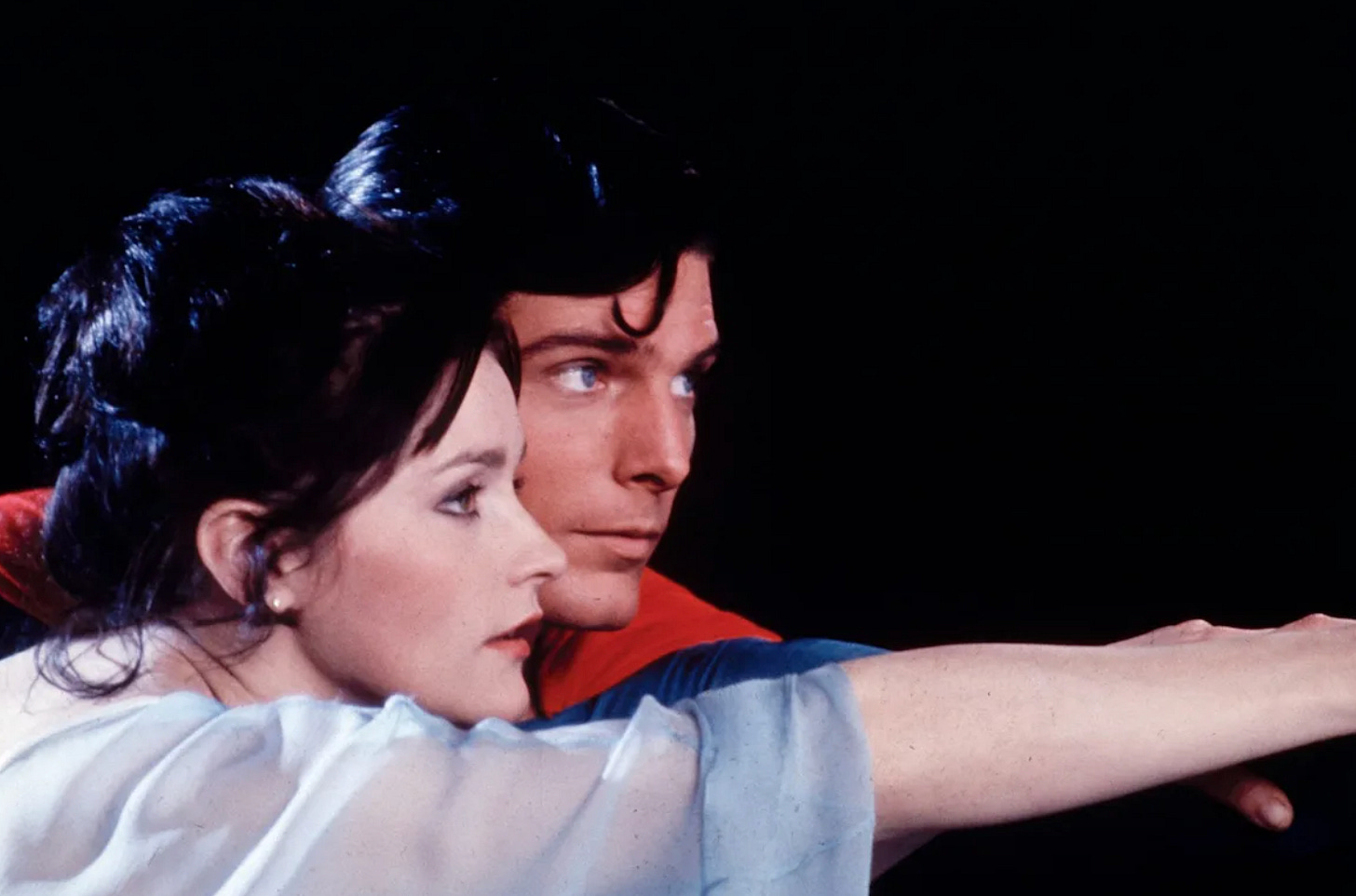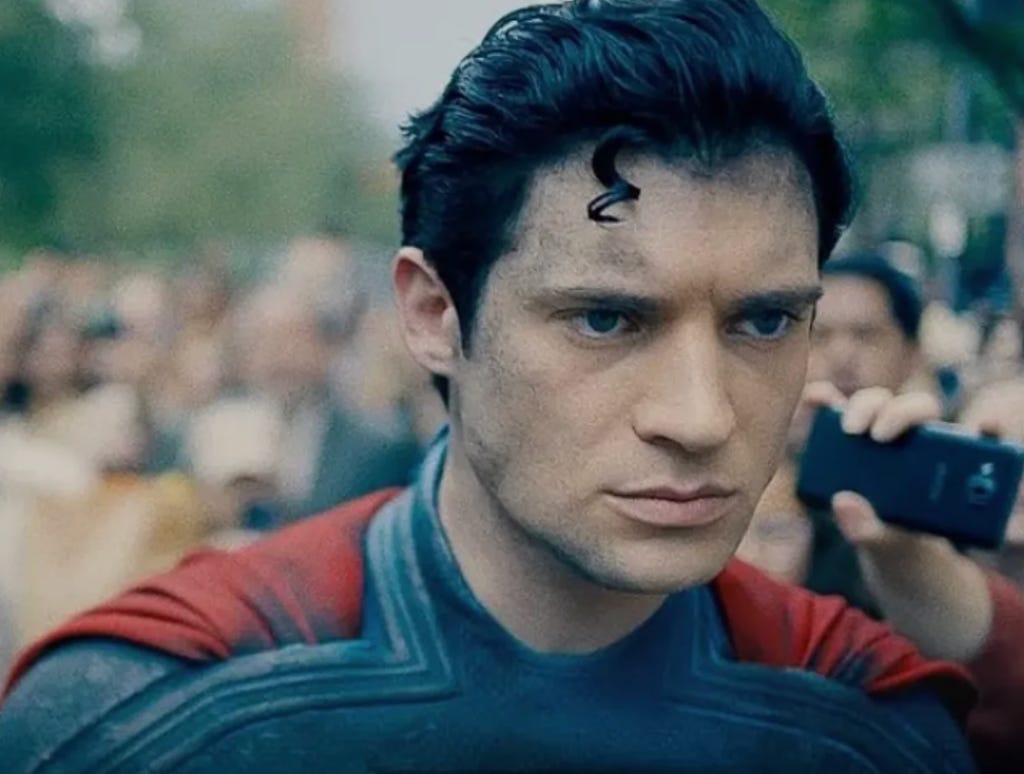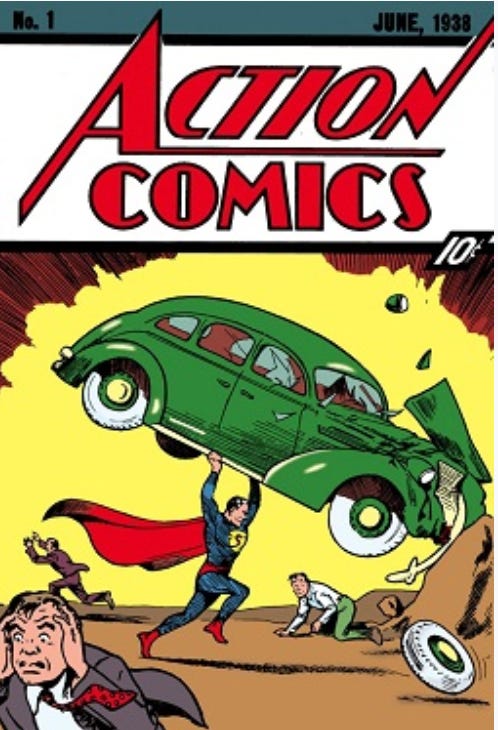Look! Up in the Sky! It’s This Week’s Recs!
Superman Returns, Sort of. Plus: Krysten Ritter, Lee Pace, Glen Hansard, Petey USA, Another Creepy Wellness Cult—and More...

Dear Wags,
There is a painful truth that applies to both Krypton and Planet Earth: you can’t go home again. That moment when you were a very small child, first looking up in awe at an enormous screen, passes. We try to recapture the old razzle-dazzle, but it never quite comes off. The magic of seeing a bolt of blue come into focus—it's a bird, it's a plane—soar over Metropolis, scoop up the helpless, and save the day happens only once. We know too much, we’ve seen too much, and our souls are bleak from tawdry experience. Things can never be so simple and pure again.
The essence of Richard Donner’s 1978 crowd-pleaser, Superman: The Movie, is captured in a single word: wonder. If you’re lucky enough to meet it at an impressionable age, it stays with you. It’s buoyant, clever, romantic—and deeply optimistic. John Williams’s score introduces the Man of Steel with a triumphal fanfare that seems to call his name: SUPER-man! Then come the strings that swoon with our hero in flight, Lois Lane in his arms. Here we are, in the stratosphere, circling the Statue of Liberty, the lights of Metropolis twinkling below. Even the hardest heart takes wing.
To hear those notes again, nearly 50 years later, in Superman—a candy-colored juggernaut brought to you by James Gunn and DC Studios—is to feel a pang of longing. Because superheroes, and Hollywood, are no longer what they were. Because simple, evocative myths have become dense “cinematic universes,” with more content clinging to them than fake musculature on an overdone bodysuit. Because, in the name of fan service, merchandising, and ever-shifting demands for relevance, we keep muddying the power of a singular narrative.
It hardly matters whether a few critics call this Superman a good movie or a bad one (the reception is mixed). What matters is whether a film is innocent or cynical—and whether its makers dare, as Donner did, to be exceptional. Will our compulsive need to drag in every supporting character, reference a dozen convoluted plotlines, and appease aging fanboys with Easter eggs and callbacks ruin the simple joy of meeting a legend for the very first time?
Superman: The Movie was the first superhero blockbuster—the ur-text from which today’s bloated franchises sprang. It was followed by a very good sequel, and then two lousy ones. The film made Christopher Reeve a star, and his performance—playing Clark Kent as a flustered Cary Grant in a screwball comedy, opposite Margot Kidder’s whip-smart Lois Lane channeling Rosalind Russell—still shadows the role.
There have been many others, of course—among them Kirk Alyn in the 1940s serials, George Reeves on early television, Brandon Routh in Superman Returns, Henry Cavill in the Snyder-era reboots, and now David Corenswet. Along the way came Tom Welling, Dean Cain, and even Nicolas Cage in a fleeting cameo. But Reeve set an impossibly high standard, one that was both chivalrous and self-aware.
Because there is no escaping Reeve, there’s a tendency to impersonate him, Dudley Do-Right cadence and all. In fairness, Superman is a comic book character; his personality is rather fixed (though nerds can run down all the ways he’s changed since 1938). This runs counter to the impulse of every filmmaker: to modernize an icon, to clock all the ways culture has shifted, and to be knowing in a James Gunn sort of way. We want to hear the story again, but with snarky in-jokes baked in.

That’s a lot to saddle Corenswet with. He’s a likable actor, with the requisite square jaw, blue eyes, and curlicue of dark hair on his forehead. He has a suitably feisty Lois Lane in Rachel Brosnahan to parry with, in yet another evocation of The Front Page. If we still had Central Casting, they’d fit the parts. The problem is that too much surrounds them—a metaverse full of less compelling characters, the usual pile of spaghetti for a plot—that the events onscreen become, yet again, less a story than a breathless placeholder for whatever rolls off the assembly line next.
Another unhappy fact no 8-year-old or movie producer likes to admit: superhero stories seldom improve after the origin tale. We all know about Kal-El from Krypton, sent to Earth as an infant—like Moses among the bulrushes—just before his home planet is destroyed. He’s adopted by Ma and Pa Kent, a sturdy farm couple in the American Midwest, and heads off to the big city to make a career in media, masking his true identity with a flimsy pair of glasses. He meets Lois, cub reporter Jimmy Olsen, and irascible editor Perry White. He battles Lex Luthor, the bald megalomaniac and Superman’s opposite: a brainy misanthrope, not a brawny idealist. The world is saved. That is the legend.
It never gets better—on the page or onscreen—as mythology inexorably densifies. Here, Superman is crowded on all sides by other super-powered beings (called “meta-humans” in DC parlance, their answer to Marvel’s “mutants”). He has a cuddly dog, Krypto; a flock of nattering robots ruining the ambience of the Fortress of Solitude; the much lesser lights of the Justice Gang, including Green Lantern, Hawkgirl, and Mr. Terrific; and his cousin Kara, a.k.a. Supergirl.
This Superman doesn’t begin on dying Krypton, but somewhere in the middle of a long, overbooked soap opera. Superbeings have always been among us; they wreak havoc, make wisecracks, and cavort against a green screen. But they’re hardly extraordinary. All these forgettable characters appear in the comics and are being positioned for future installments to help revive DC’s flagging box office fortunes (Gunn and his producing partner, Peter Safran, now run the studio). To meet expectations, Superman can’t simply reboot an old story. It has to sell an entire cinematic universe, and, tariffs permitting, a slew of action figures—one Easter egg at a time.
This model makes for overstuffed movies, draining the power of the individual narrative in service of a sprawling brand. And as a revenue driver for Hollywood, it’s in trouble. Audiences are exhausted by comic-book flotsam—and the box office shows it. Even if Superman becomes a global hit, it won’t be because it carves out a place for Kal-El as a uniquely memorable character. There’s a reason nobody except comic-book obsessives has heard of Mr. Terrific.
Scholars will quibble, but Superman is our original, eternal superhero. He stands alone—a godlike stranger in a land of mortals. His alien nature is central to the story, as originally devised by two outsiders: Jerry Siegel and Joe Shuster, Jewish kids from Depression-era Cleveland. Kal-El’s immigrant roots have been exhaustively studied—the Hebrew-sounding name, the parallels with Moses, the Golem-like figure summoned to protect the powerless in their hour of need—all deeply rooted in the Jewish experience. He was born just as fascism was rising in Europe: an American myth forged in answer to a darker vision of the Übermensch.
In his earliest adventures, Superman was something of a social justice warrior, going after slumlords, greedy businessmen, and yes, corrupt media barons. By World War II, he matured into the figure most people recognize: a champion of truth, justice, and a specifically American way. That transformation wasn’t a betrayal of his origins—it was their fulfillment. For Siegel and Shuster, Superman embodied the ideals they hoped America could live up to in a corrupt and violent world. If Kal-El was a cosmic sojourner, he believed in assimilation.
Like a model immigrant, he joined the Establishment—noble, unyielding, and square. Bob Kane’s Batman, introduced just a year later, was darker and more tormented: a brooding detective in contrast to Superman’s sunny savior. When Marvel’s heroes arrived in the 1960s, they brought with them the hipness, disillusionment, and sarcasm of the era. By then, Superman had become the paternal figure that all younger, unrulier super-inventions were defined against.
Gunn’s hero is marooned in a fractured era as ominous as the one Siegel and Shuster grew up in. Supervillains run America and the world. The dream of working at the Daily Planet—a crusading newsroom full of truth-seeking reporters—is quaint in a crumbling media ecosystem shaped by algorithms and outrage. All of this is flicked at in Superman, thick with fuzzy analogies to the present: a Russia proxy invades a Ukraine proxy, Superman intervenes unilaterally, and a xenophobic misinformation campaign is waged against him by a vile tech-bro Lex Luthor (Nicholas Hoult). Innocent people in cages, vapid influencers, corporate greed, and creeping authoritarianism are scattered like breadcrumbs between endlessly collapsing skyscrapers—for future dissertation writers to gather and parse.
In response, Superman is sometimes himself—a straight arrow—and sometimes a super-depressive. He still wants to do right by troubled human beings. But it turns out he may have pulled a fast one on immigration authorities. The official story is that his long-dead-but-never-gone parents, Jor-El (Bradley Cooper) and Lara Lor-Van (Angela Sarafyan), sent him to Earth to protect humanity. But—if this counts as a spoiler, scurry away now—an unedited tape from the Fortress of Solitude (still the icicle palace Donner imagined) reveals something else: Jor-El hoped his son would dominate the lesser species and impregnate human females to create a sort of Muskian master race.
In other words, Superman wasn’t meant to be our savior, but another dreaded settler-colonizer. The revelation leaves him with a massive case of Kryptonian guilt, as if he just sat through a college seminar on racism and the patriarchy. Thankfully, the Kents raised him right. For a creature from outer space, Kal-El turns out to be an exemplary human being—as if there were ever any doubt.
If there are provocative themes in this stew—enough for a few goons to half-heartedly condemn Superman as “woke”—they don’t always blend smoothly with Gunn’s genius for comedy. The 2014 Marvel gem Guardians of the Galaxy showcased his gift for lighthearted adventure, laced with Gen X pop-culture references—not least the throbbing Ooga Chaka of Blue Swede’s 1974 version of “Hooked on a Feeling.” But the Guardians were lesser-known characters, unfamiliar to most moviegoers. Gunn could invent them onscreen, and irreverence suited the interstellar silliness.
Superman is different. He’s an unironic, pure-hearted hero—an emblem of virtue, not a smirk or an attitude flex. The challenge has always been making that kind of goodness land with a cynical public. Christopher Reeve found the humor in the character by taking him seriously. As a filmmaker, Gunn tends to lean the other way.
And that is the challenge of the character and his mythology in a jaded age. In all his incarnations—Kal-El, Clark Kent, Superman—Earth’s Greatest Super Hero is an innocent and a believer who doesn’t wink at the camera. He comes to us alone, invincible save for kryptonite, and startlingly pure of heart. He falls from the stars, and he falls in love. With Lois, of course, and with the rest of us, too. It’s a simple story we keep insisting we’ve outgrown. Yet instead of leaving well enough alone, we always clamor for more. Doesn’t every new generation deserve a chance to simply soar above the clouds?
Yours Ever,
Dirk Armstrong
Back in a Slash!
Dexter: Resurrection (Paramount+/Showtime). The whole serial-killer-as-antihero-you-root-for thing? It’s not going away. A gruesome genre only grows in popularity, even as actual serial killing declines—thanks, DNA analysis! And so, here again, is Michael C. Hall, who must be at least a little tired of righteously chopping people up, as Dexter Morgan: the good-guy murderer now stalking victims beneath the bright lights of New York.
If you’re watching this mayhem, you already know this is a sequel to Dexter (2006–2013) and Dexter: New Blood (2021–2022), and follows a prequel, Dexter: Original Sin (2024). At this point, Dexter has racked up at least 150 unlovable victims. So when he heads to Manhattan after surviving being shot by his son Harrison (John Alcott), we know he’s closing in on some kind of unholy record.
That puts him in the sights of yet another billionaire sociopath (Peter Dinklage), who—alongside his icy apparatchik (Uma Thurman)—is assembling some sort of Legion of Serial Killers. Among them: Krysten Ritter as someone nicknamed “Lady Vengeance,” which, honestly, should get you laughed out of the union. David Zayas and James Remar return as the Miami cops still on Dexter’s trail. Another show, another morgue full of body bags.
— Catherine Martin
Keep reading with a 7-day free trial
Subscribe to CultureWag to keep reading this post and get 7 days of free access to the full post archives.





